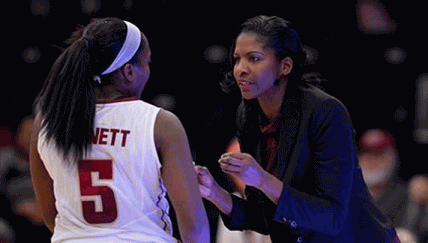Rebuilding A Player's Confidence
by Anthony B. Lanzillo
From the Coach’s Clipboard Basketball Playbook"Helping coaches coach better..."
Tone Lanzillo is a mental prep coach to athletes who want to be mentally prepared to play their best game. He has worked with student-athletes, from middle school through high school and into college, in such sports as basketball, football, soccer and lacrosse. Over the past several years, he has written for a number of sports blogs and websites, including FirstDown Playbook, Coaches Training Room, Ultimate Hockey Source, and Lax Playbook.
Contact: Anthony B. Lanzillo
"Confidence is acclaimed as the most critical psychological characteristic influencing sports performance."
- Craig Manning - The Fearless Mind: 5 Essential Steps to Higher Performance
"A lack of confidence can shrink a person to a diminished expression of his capacity as a human. It shrinks an athlete to a fraction of his capacity as a performer."
- H. A. Dorfman - Coaching the Mental Game
Whether you coach an AAU team, at a high school or in college, one of the biggest challenges that you may face during the basketball season is identifying and helping one of your players who has begun to lose his confidence. Not only will this player refuse to tell the coaching staff what he is feeling or experiencing but he will probably try to hide this sense of insecurity. Hopefully, you can see the signs and then successfully engage the player to rebuild his confidence.
There are a number of different situations or events in a game that can trigger a player's loss of confidence. It could start when one of your players misses two free throw shots in a tight game. Maybe, it's when a player is having a difficult time defending an opposing player who scores every time he comes down the court. Or, there is that one player on your team who doesn't know how to appropriately respond to verbal taunting from the opposing players.

A basketball player who is losing his confidence is someone who begins to doubt himself and is questioning his skills and abilities on the court. It is a player who is probably thinking about what he doesn't want to see happen, and therefore, has becoming more anxious and nervous. It is a player who may become more preoccupied with things taking place off the court, and thereby worrying more about how he looks to people off the court than how he needs to play with his teammates on the court. This same player can't stay in the present moment, keep his focus on what he controls and has now lost his composure.
At a team practice, you can talk to your players about the importance of developing and maintaining one's confidence. You can encourage them to practice some simple mental skills that will help them build and strengthen their confidence for each game and the whole season. First, you want them to set personal goals and to identify the specific steps that they will take to reach those goals. Second, you want them to learn how to visualize and mentally rehearse how they want to play in different game-time situations. Third, you want them to identify one or two affirmations that they can tell themselves when they walk onto the court. And fourth, you want your players to know what they need to focus on and what they need to tune out when they are performing.
If you need to meet with or speak to an individual player who is struggling with his self-confidence, here are a few things that you can review with him. Remind this player that he should only measure himself against himself instead of measuring himself against other players. Next, you want to talk to the player about staying focused on the process of becoming a better player instead of always looking at the results or statistics. It's important that the player realizes that every player will make mistakes and that mistakes are part of the learning process to becoming a better player.
Also, have the player develop a personal highlights film that he can replay in his mind on a regular basis of successful moments from previous practices and games. And, I would strongly encourage you to talk to this player about how he can create a compelling story about his "athletic career" where he pictures himself as the hero who has successfully accomplished or achieved certain goals; instead of seeing himself as the victim in his sports life.
Related page: Basketball Mental Prep Playbook